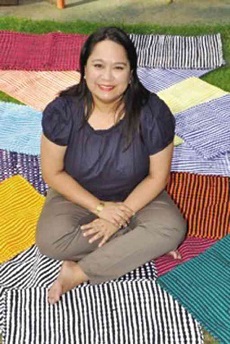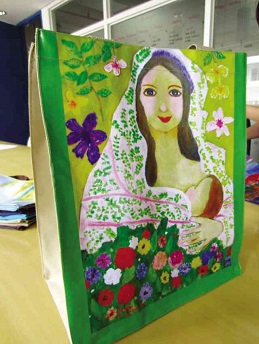It started as a project of the office of Vice Mayor Joy Belmonte of Quezon City. Some 90 women (and one male) from low-income communities in the city, mostly from Payatas, had to be trained to weave, sew, process food, make soap and the like.
Tapped for the job of training them was managing consultant Trixie Olizon-Silerio of Peoplestrong Human Resources Co., a training firm set up in 2008. Trixie took up Interdisciplinary Studies at the Ateneo de Manila and has a Master in Business Management from the Asian Institute of Management (AIM), where she taught an entrepreneurship program for five years.
The Quezon City project entailed training for would-be trainers. “So the training pushed through and we trained them to be trainers,” says the entrepreneur. “This is how to do it. There were demos, and things like that.” And when she saw the products, she exclaims: “Sobrang nagustuhan ko (I was really impressed).”
A challenge, however, arose. The producers did not know where to market the products.
So Trixie, only during the fourth quarter of last year, set up another company, Repurposed Manila (repurposedmanila@yahoo.com) with the express purpose of marketing the goods and finding the right buyers. Why “Repurposed”?
Necklaces, rosary bracelets
“It’s another way of recycling,” she explains. “For example, a retazo (scrap fiber) if you put in the right colors, can be made into a doormat, something of value, useful. You can weave baskets out of old newspapers. There are necklaces and rosary bracelets made from old, glossy magazines.”
Take the simple doormat which you can find in the sidewalks and flea markets. “If you make it really big,” says Trixie,” you add value to it. We are particular with the colors. We tell the producers the buyers match these with their bedrooms and bathrooms.”
Once she was stuck with products which, well, lacked appeal: “So I asked the mothers to do it right, I had to teach the right combination of colors. We match their products with the right market.”
Most appealing are the tote bags which have colorful, attractive designs of paintings by senior citizens who discovered art when they retired.
Cash terms
The producers are paid in cash for their products. Whatever they get goes to food and other day-to-day, essential expenses. They don’t set terms, because they need cash right away.
Financially strapped though they may be, they did not forget the victims of Supertyphoon “Yolanda.” The mothers lowered the prices of the bigger mats, posted these on Facebook, and then gave them away to the victims as sleeping mats.
New life
For Repurposed Manila, business is still in the infancy stage. “Business is good,” says Trixie. “But we need to widen my customer base, get the brands known, put the brands out there so that there will be recognition of the brand. Hindi pa todo-todo (not yet full blown), it’s the start-up phase.”
Being in this endeavor is “like giving new life to the retazos, scrap, old magazines and newspapers etc. and giving purpose to the people we want to help. It’s giving new life to things and human beings.”
She laughs, “may rhyme yan, things and beings.”



